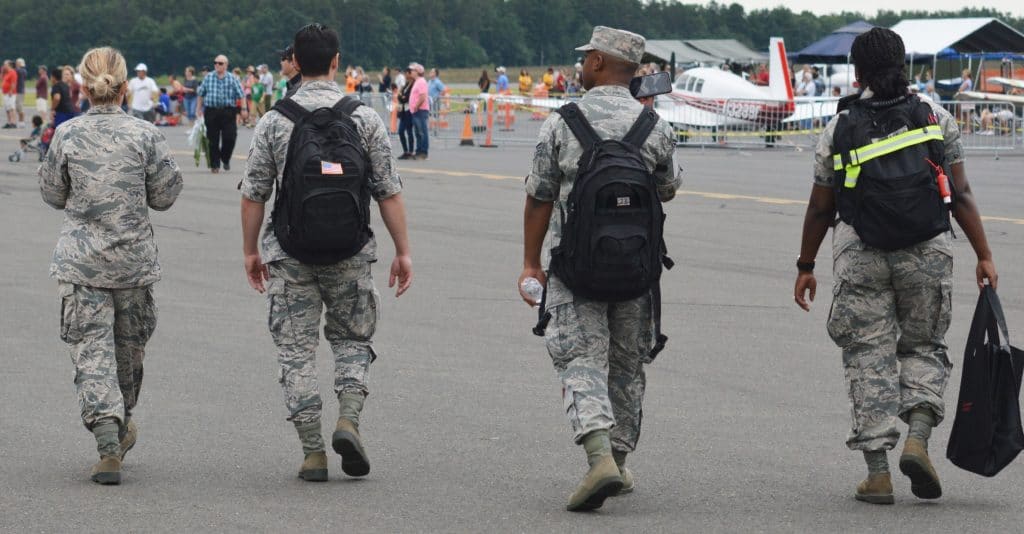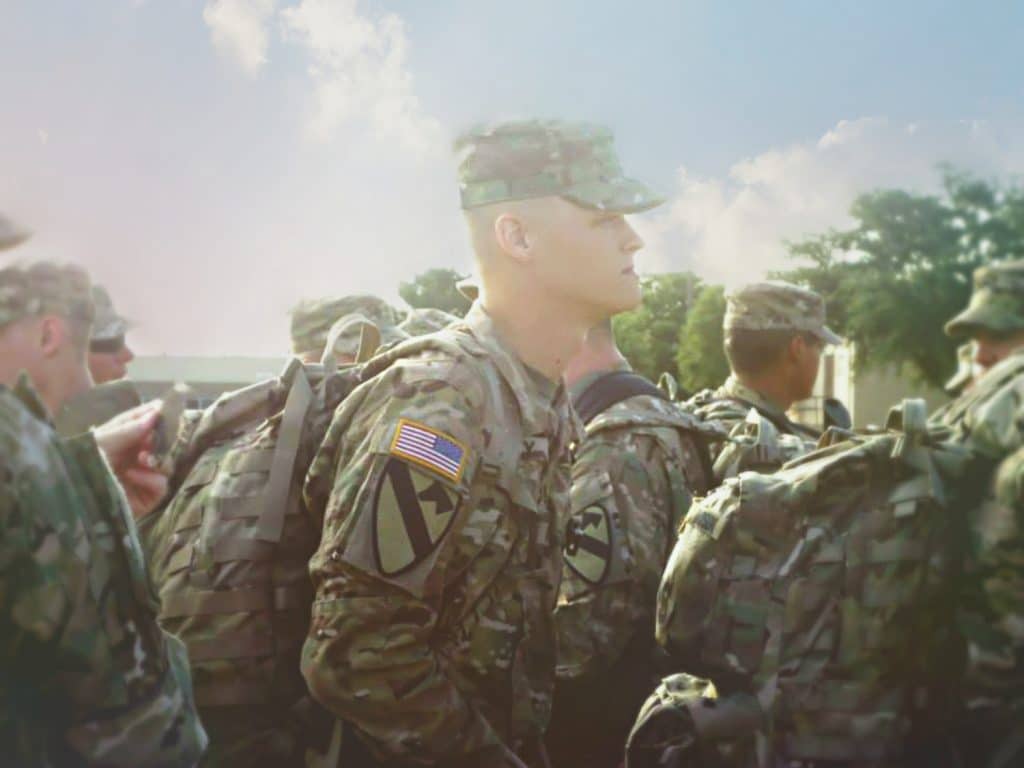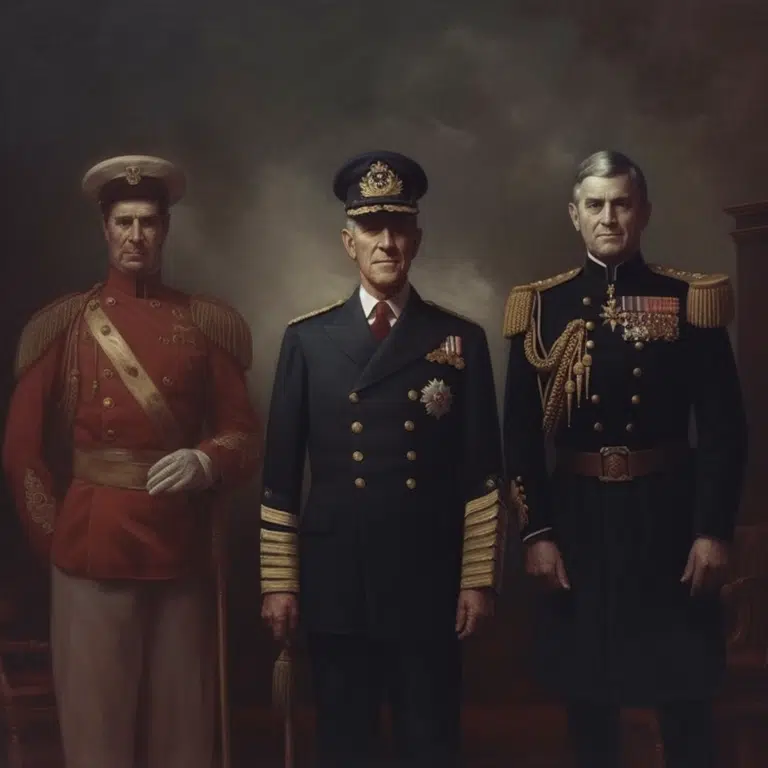What Does AWOL & UA Mean In The Military?
Important Note: When you buy through our links, we may earn a commission. As an Amazon Associate we earn from qualifying purchases. Content, pricing, offers and availability are subject to change at any time - more info.
AWOL, or Absent Without Leave, is one of the most severe military offenses. The individual will face court-martial and potentially jail time. People often wonder what AWOL means in the military. UA is a different abbreviation for Absent Without Leave, and it typically means that a service member will be administratively separated from service for violating the provisions of Article 86 (Absent without leave) or Article 87 (Absent without leave; missing movement).”
- What Does AWOL Mean In The Military?
- What Does AU Mean In The Military?
- What Are Punishments For AWOL?
- What Are Punishments For UA?
- What Are The Stages of AWOL?
- What Are The Stages Of UA?
- Does UA/AWOL Mean Desertion?
- What Were Past War Desertion Rates?
- What Do Leaders Say About AWOL/UA/Desertion?
- What Happens To The Accused?
- Final Note
What Does AWOL Mean In The Military?

Absent without leave (AWOL) is a military or naval term related to an individual absent from his unit without permission. AWOL is also connected to missing movement. This can be a severe offense, and there have been times when someone absent for 30 days or more had to face punishment for not following the rules. This type of offense will affect one’s duty status, the result being that the individual may no longer be considered active duty according to Title 10 USC Section 101 (Active duty).
What Does AU Mean In The Military?
The abbreviation AU stands for “Abandonment Under Fire.” It is a term associated with the US Army, and it pertains to situations in the field where an individual has left his post without permission in times of combat. This can result in death for those who are not able or willing to rejoin their unit because of the nature of their mission or be used by their enemy against them.
What Are Punishments For AWOL?
Punishments for AWOL are dependent on the situation and can be faced in various ways. Those who do not return after being reported as absent may have to deal with demotion and punishment, and they could even be forced out of the military. They will not receive any retirement benefits. Those who have more than one offense may be court-martialed, and they could even spend time in jail if they are found guilty of several crimes. In addition to criminal punishments, those absent without leave may also face civil charges based on their position. For example, a civilian may face a civil lawsuit for stealing from an employer or missing work for extended periods (more than 30 days).
What Are Punishments For UA?
Those absent without leave (UA) may also face punishment. They may be demoted, reprimanded, or receive a less than favorable evaluation report. There are also cases where the individual will be dismissed from military service, which means they will have to pay back the time they had already served by law. Depending on their situation, they could face jail time if they were found guilty of other offenses such as theft or assault.
What Are The Stages of AWOL?
AWOL can be charged in two different ways. There are two types of AWOL cases and both deal with the same issue. The first is called desertion, and it is when an individual voluntarily leaves his post without permission and does not even attempt to return to his unit before he accomplishes his mission. In some cases, the individual may return after some time, but this does not entirely negate that the individual left without permission.
The second type is called AWOL for more than 30 days. When an individual has done this for more than 30 days without permission, he will face court-martial in front of a judge or jury to decide if they should be dismissed from military service or receive less than favorable evaluations. Suppose the military feels that the individual should be responsible for his actions. In that case, there is a chance that they will not only dismiss him from service but also from specific programs and scholarships that he may have previously held.
What Are The Stages Of UA?
The stages of UA are different in some cases. If an individual is on active duty, they may receive an Article 15 or be discharged from the military. Again, this will depend entirely on their situation and what they have been charged with in the past. In some cases, those absent for more than 30 days may be asked to resign from the service before being discharged from the military because of their actions.
Does UA/AWOL Mean Desertion?
Unlike desertion, no, absent without leave (AWOL) or absent without authority. They are AWOL means that a service member has left their unit voluntarily and has not returned or made any attempts to return to their team. This can also be a severe offense, and there are many cases where people who were AWOL received sentences in the range of one year up to life. On the other hand, desertion means that a person leaves their assigned military post during wartime and does not attempt to return. This is a severe offense, and the individual will most likely face heavy consequences for their actions. This is considered a crime and a violation of the Uniform Code of Military Justice.
What Were Past War Desertion Rates?

Over the past several wars, desertion rates have varied considerably. This can be attributed to many different factors that can affect these numbers. Some of the more prominent factors include the levels of combat tension in a particular region, the relevant leadership of that time, and the size of a specific force being sent over to a location.
The lowest rate in the military was during World War I, and it was .2%. The next lowest rate from this period was during World War II, and it was .3%. There were many different reasons for desertion in these wars, but one primary reason was low wages for recruits coming into the military. This was a massive issue during the Korean and Vietnam wars.
During the Vietnam War, there were several different reasons for desertion. One of them is when soldiers become upset about being away from their loved ones for an extended time and wish to return home. Other factors include some that were never recorded, like a significant increase in PTSD rates and also the perception that being away from family members was not that useful when it came to fighting the war, as well as some other factors such as unimportant military training made people wish to return home.
The highest rate during this period was during World War I, and it was .6%. Many different factors led to the high desertion rate during this war, but one key one was the unprecedented number of young men going into the fight. In 1915, there were over 2 million volunteers for military service. Again, it is essential to note that these numbers are from a different time, and many other factors could dramatically affect these numbers for desertion during this period.
What Do Leaders Say About AWOL/UA/Desertion?
Other military sayings can help provide insight into the different types of AWOL cases. Below are some more common phrases and terms that may be seen in these cases from top military leaders past and present:
“Desertion is the biggest threat to Unit cohesion.” – This quote is attributed to John Paul Jones during the Revolutionary War. This is because desertion can severely affect an entire military unit by disrupting the battle lines and harming discipline and leadership within the department.
“There’s nothing easy about AWOL; it’s easy to do, but hard to do right.” – This quote is attributed to General William Westmoreland during a speech he held for newly promoted officers at West Point. He says that AWOL is a serious offense, and it is straightforward for the individual to leave the military, but it can be devastating for those who are AWOL.
“You can run from your problems, but you can’t hide.” – This phrase is attributed to George Bush during his tenure as President of the United States. This quote comes from a speech in San Antonio, Texas, in 2004. It speaks to the military and how they cannot simply avoid their issues or responsibilities and hope that they will go away independently. If a person leaves their post or unit without permission or justification, they will have to face all of their issues when they return.
“Desertion is a hard habit to break.” – This quote is attributed to General James Mattis during his speech at West Point. This quote comes from the Desertion and Conspicuous Gallantry section of the Manual for Courts-Martial, published in 1954. It speaks about how it can be challenging for people to get over the idea that leaving their unit for more than 30 days is wrong or against their beliefs. Military personnel has to think about this before they take this kind of an action because if they do not think about it, it can have a devastating effect on their entire military career.
“If your son deserts, you don’t know what will happen. But, if your son is AWOL, you can count on it.” – This quote comes from President George Bush, and it was taken from a speech that he gave in San Antonio, Texas, in 2004. This quote says that if a service member’s family member is AWOL, they need to be aware of what will happen because they can’t ignore their actions. They also cannot worry that their loved ones may be hurt or harmed as long as they are AWOL because there is a chance this may happen.
What Happens To The Accused?

If a person is accused of being AWOL and they happen to be currently serving in the United States Armed Forces, they will go before a military court known as an Article 32 hearing. They will be asked if they are willing to turn themselves over to the military police or if they will go back to their unit. If they refuse to do either of these things, the case will go forward. If the accused is willing, the patient will be dismissed, and the person can serve out their term of service in their home state.
If a person is accused of being AWOL while currently serving in a foreign country, they may have a different type of hearing before being able to return home. For these cases to move forward, there needs to be permanent abandonment.
For every year between 2001 and 2003, the Department of Defense reported an average of 4,863 men and women were missed from the rolls for military service per year. The overwhelming majority were deserters who never wrote or returned to their assigned military unit. Most commonly, these cases turn into desertion. The Army had the highest number of AWOL cases at 1,061, followed by the Marine Corps with 884 points and then 562 reported in Air Force.
Final Note
AWOL is a severe offense in the military, and because it is a crime that can be punished, many people are unwilling to report their absence to their unit. In recent years, AWOL cases, in general, have been on the rise. This is possible because more US armed forces members are entering civilian life due to the end of tours or commitment expiration dates.






